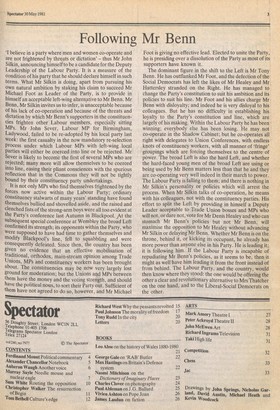Following Mr Benn
'I believe in a party where men and women co-operate and are not frightened by threats or dictation' — thus Mr John Silkin, announcing himself to be a candidate for the Deputy Leadership of the Labour Party. It is a measure of the condition of his party that he should declare himself in such terms. What Mr Silkin is doing, apart from pursuing his own natural ambition by staking his claim to succeed Mr Michael Foot as Leader of the Party, is to provide in himself an acceptable left-wing alternative to Mr Benn. Mr Benn, Mr Silkin invites us to infer, is unacceptable because of his lack of co-operation and because of the threats and dictation by which Mr Benn's supporters in the constituencies frighten other Labour members, especially sitting MPs. Mr John Sever, Labour MP for Birmingham, Ladywood, failed to be re-adopted by his local party last week: the first casualty in the now mandatory re-selection process under which Labour MPs with left-wing local parties will either be coerced into line or be rejected. Mr Sever is likely to become the first of several MPs who are rejected; many more will allow themselves to be coerced into line, easing their pliant consciences with the spurious reflection that in the Commons they will not be tightly bound by their constituency party undertakings. It is not only MPs who find themselves frightened by the forces now active within the Labour Party; ordinary constituency stalwarts of many years' standing have found themselves bullied and shovelled aside, and the raised and Clenched fists of the strong-arm boys were all too evident at the Party's conference last Autumn in Blackpool. At the subsequent special conference at Wembley the broad Left confirmed its strength; its opponents within the Party, who were supposed to have had time to gather themselves and modify Blackpool's line, fell to squabbling and were consequently defeated. Since then, the country has been given no evidence that an effective mobilisation of traditional, orthodox, main-stream opinion among Trade Unions, MPs and constituency workers has been brought about. The constituencies may be now very largely lost ground for moderation; but the Unions and MPs between them have the money and the voting strength, and should have the political nous, to sort their Party out. Sufficient of them have not agreed to do so, however, and Mr Michael Foot is giving no effective lead. Elected to unite the Party, he is presiding over a dissolution of the Party as most of its supporters have known it.
The dominant figure in the shift to the Left is Mr Tony Benn. He has outflanked Mr Foot, and the defection of the Social Democrats has left the likes of Mr Healey and Mr Hattersley stranded on the Right. He has managed to change the Party's constitution to suit his ambition and its policies to suit his line. Mr Foot and his allies charge Mr Benn with disloyalty; and indeed he is very disloyal to his colleagues. But he has no difficulty in establishing his loyalty to the Party's constitution and line, which are largely of his making. Within the Labour Party he has been winning; everybody else has been losing. He may not co-operate in the Shadow Cabinet; but he co-operates all right with delegates to Union Conferences, with endless knots of constituency workers, with all manner of 'fringe' groupings which are forcing themselves to the centre of power. The broad Left is also the hard Left, and whether the hard-faced young men of the broad Left are using or being used by Mr Benn matters less than that he and they are co-operating very well indeed in their march to power. The Labour Party is falling to them; and there is nothing in Mr Silkin's personality or policies which will arrest the process. When Mr Silkin talks of co-operation, he means with his colleagues, not with the constituency parties. His effort to split the Left by providing in himself a Deputy Leader acceptable to Trade Union bosses and MPs who will not, or dare not, vote for Mr Denis Healey and who can stomach Mr Benn's policies but not Mr Benn, will maximise the opposition to Mr Healey without advancing Mr Silkin or delaying Mr Benn. Whether Mr Benn is on the throne, behind it, or kicking its occupant, he already has more power than anyone else in his Party. He is leading it; it is following him. If the Labour Party is incapable of repudiating Mr Benn's policies, as it seems to be, then it might as well have him leading it from the front instead of from behind. The Labour Party, and the country, would then know where they stood: the one would be offering the other a clear and revolutionary alternative to Mrs Thatcher on the one hand, and to the Liberal-Social Democrats on the other.










































 Previous page
Previous page